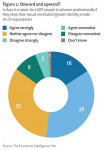Capitalism entering a new era of lower risk tolerance, higher regulation and slower growth
The report examines the shape of this new landscape, how management decisions will change as a result and whether business people support government measures taken so far to stem the crisis. In summary, the executives surveyed believe there will be more government oversight, more economic nationalism, less risk-taking and slower growth. Decision-making within businesses will reflect a new reality, as frugal customers and state regulators hold sway. The respondents support emergency intervention in the banking sector, but their opinions are more conservative when it comes to further reform, such as outright nationalisation of other key industries, creating so-called bad banks that buy and ring-fence toxic debts, or limits on executive pay and bonuses.
“Our survey shows how much the economic downturn has alarmed the business community,” says Robin Bew, editorial director and chief economist at the Economist Intelligence Unit. “Many respondents believe the psychological effects of this recession will last far into the next recovery. They expect they will need to adjust to a world of conservative banking, frugal customers and more active regulators for some time to come.”
The main findings of the survey include:
·Capitalism has “fundamentally changed”
Respondents say that their long-held faith in free markets is at an end, and Adam Smith's "invisible hand" appears to be malfunctioning. Nearly 60% of senior business executives agree that “the current crisis has fundamentally changed capitalism”. Moreover, 46% believe that when the upturn arrives there is unlikely to be a return to the finance driven economy of the past, with easy credit fuelling investment and asset prices.
·Executives want more regulation in the banking sector and beyond
Today, regulation is no longer seen as counter-productive meddling in otherwise perfect markets, but a prerequisite for a functioning global economy. Business people are not known for their affection for red tape, and usually balk at the idea of accepting more bureaucracy. Yet almost two-thirds (65%) of executives agree with the statement: “I am in favour of further bank regulation, even if the result is slower economic growth.”
·Regulators and customers will have more sway over business decision-making as a result of the crisis
Power centres are set to shift as well, with some stakeholders exerting more pressure than others. At the top of the influence list are regulators, customers and creditors. In contrast, employees, non-governmental organisations and trade unions will be left out in the cold, with large majorities believing their influence will wane or stay the same.
·Caution will prevail in the aftermath
Risk appetites will diminish in the next two years, and remain flat in the following two to five years. Respondents say that the hangover from this downturn will be longer than in the past, with almost 60% believing that economic growth will be harder to achieve in the next recovery.
·There is broad support for government measures taken so far to stem the crisis
Nearly 70% of respondents support government intervention in the banking sector such as buying shares and nationalisation. The majority of respondents also believe that governments’ response to the downturn will have a long-term positive effect on their business. Only 17% think that the measures taken will have a negative effect on their long-term business prospects.
웹사이트: http://www.eiu.com
연락처
Joanne McKenna
Press Liaison
Economist Intelligence Unit
26 Red Lion Square
London
WC1R 4HQ
UK
Direct: +44 (0) 20 7576 8188
Sales: +44 (0) 20 7576 8181
Switchboard: +44 (0) 20 7576 8000
email: 이메일 보내기
이 보도자료는 Economist Intelligence Unit가(이) 작성해 뉴스와이어 서비스를 통해 배포한 뉴스입니다.




